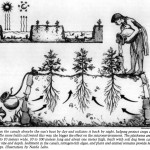A Seamless Dystopia. [The Nation] “When I was younger, growing up in the rural but rapidly developing small town of my youth, I believed that cities were the place where one could find freedom. The greatest disappointment of my young adulthood has been the discovery that this is not true.” Via Arts&Letters Daily.
Surveilling Alone. [The New Atlantis] “Interpersonal surveillance technologies have rendered us far more visible to each other and given people a sense of security and safety when it comes to protecting their homes and loved ones. But they have not helped rebuild the one thing that human beings need to live together in peace: trust.”
After the Holocene. [Gene Ray] “Rightwing and leftwing “prepping” may share some practices and technics, but no equation between them is possible.”
Torching the Google car: Why the growing revolt against big tech just escalated. [Blood in the machine] “The original Luddites opposed “machinery hurtful to commonality,” not any and all new tech. Today’s self-driving car adversaries seem to be operating on a similar principle.”
The Goba of Ladakh: Current Relevance of a Traditional Governance System. [Vikalp sangam] Indigenous and other local traditional communities in India have had their own systems of local governance, which have informed people’s interaction with fellow community members as well as the rest of nature.




